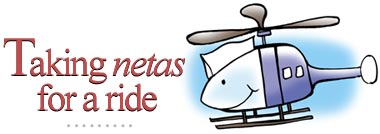Home > News > Elections 2004 > Special
The Rediff Election Special/George Iype
April 08, 2004

Come election time and political movers and shakers get into a hectic cross-country race to woo voters. But the movers and shakers need more than a pair of wheels to get from one meeting to another.
For long, the great election tamasha was synonymous with the faithful workhorse of a car called the Ambassador.
But campaigns have undergone a massive facelift. And so have modes of transportation.
rediff.com takes a look at what is in vogue among our netas these days.
On the road
 Ambassadors are out. Multi Utility Vehicles or MUVs are in.
Ambassadors are out. Multi Utility Vehicles or MUVs are in.
South Delhi Travels, a taxi operator in Delhi, has bought 14 new Toyota Qualises in the last two months. Political leaders now proudly set out to campaign in these MUVs.
Attesting to the Qualis' popularity is Congress heir apparent Rahul Gandhi who uses it to campaign in Amethi. Another fan is Andhra Pradesh Chief Minister Nara Chandrababu Naidu.
But it isn't only the Qualis that has caught the politicians' fancy. The Tata Sumo, the Mahindra's Scorpio, Bolero and Marshall and the Bajaj Tempo Trax are frequently seen on campaigns.
Taxi owner Surender Singh says the MUVs are perfect for campaigns. "They are spacious and convenient. They can travel on rugged roads and in remote areas unlike normal cars," he says.
The cost of hiring an air-conditioned MUV per day? Rs 2,000.
In the air
 High-flying leaders are often literally so.
High-flying leaders are often literally so.
Prime Minister Atal Bihari Vajpayee, Bharatiya Janata Party chief M Venkaiah Naidu, Congress chief Sonia Gandhi, Chandrababu Naidu and Uttar Pradesh Chief Minister Mulayam Singh Yadav prefer to take a plane every time they decide to campaign.
Small aircraft, helicopters, even private jets are used. Samajwadi Party General Secretary Amar Singh uses a private jet to shuttle between Lucknow and Delhi.
BJP and Congress election managers have together commandeered some 40 helicopters and eight aircraft to ferry their top leaders from one constituency to another.
The BJP has allocated roughly Rs 60 crore (Rs 600 million) and the Congress around Rs 25 crore (Rs 250 million) for carting around their big guns.
For the crowd
Netas can fly across states or zip on roads. But what is the point if people aren't present to listen to them?
Parties make sure there are enough ears for a politician's speech by collecting people for meetings. And they do  that using buses and trucks.
that using buses and trucks.
So when Deputy Prime Minister L K Advani launched his Bharat Uday Yatra from Kanyakumari, the BJP's Tamil Nadu unit arranged for 500 buses to take people to the venue.
When Chandrababu Naidu launched his campaign last month, the Telugu Desam Party hired 11,000 buses and 15,000 trucks to carry some 500,000 people from rural areas to Hyderabad.
This Lok Sabha election will witness approximately 600 rallies organised by various political parties across the country. Your guess is as good as mine on the number of buses and trucks to be used for transporting 'crowds' for these meetings.
How much does hiring a bus for a day cost? Rs 10,000.
For the Netizen
E-campaigns, as electronic campaigns are now called, had not emerged as a phenomenon during the 1999 election.
This time, both the BJP and Congress have set up electronic wings. The most popular e-campaign methods are SMS and e-mail.
The BJP media cell has a database of some two million e-mail users, to whom messages are sent urging them to bring Atal Bihari Vajpayee back to power. The party's SMS campaign has been directed at some 10 million mobile users.
The Congress is not as high-tech as the BJP, but is also actively wooing the voters through SMS and e-mail.
Poll Fashion
 Tattooing is in. Pamphlets are out.
Tattooing is in. Pamphlets are out.
Most young party workers wear their loyalty on their bodies. BJP and Congress tattoos are available at campaign offices and party headquarters.
The cost per tattoo? Just 50 paise.
Some companies like Regal in New Delhi have launched a new range of chairs with party symbols.
Regal says it is getting huge orders from candidates and campaign managers and has upped the production of these chairs.
Illustrations: Uttam Ghosh